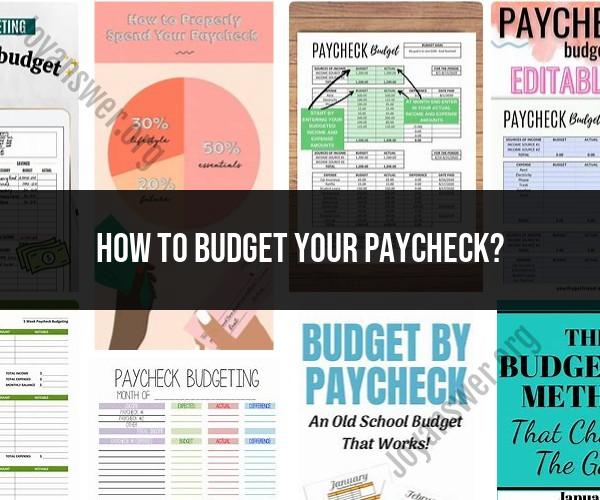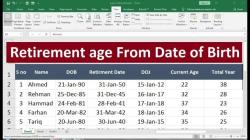How to budget your paycheck?
Budgeting your paycheck is a crucial financial skill that can help you manage your expenses, save money, and achieve your financial goals. Here's a practical guide to help you create and stick to a budget:
1. Calculate Your Monthly Income:
- Determine your total monthly income, including your salary, wages, freelance earnings, and any other sources of income. Focus on your net income (after taxes and deductions) for an accurate picture.
2. List Your Monthly Expenses:
- Make a list of all your monthly expenses, including fixed, variable, and discretionary expenses. Common categories include:
- Fixed Expenses: Rent/mortgage, utilities, insurance premiums, loan payments (e.g., student loans, car loans), and subscriptions.
- Variable Expenses: Groceries, transportation, healthcare, and other necessities that can vary from month to month.
- Discretionary Expenses: Entertainment, dining out, hobbies, and non-essential purchases.
3. Set Financial Goals:
- Determine your short-term and long-term financial goals. These could include building an emergency fund, paying off debt, saving for retirement, or saving for a vacation.
4. Create a Budget:
- Allocate your income to cover your expenses and achieve your financial goals. Start with your fixed expenses as they are non-negotiable.
- Use budgeting tools, apps, or spreadsheets to organize and track your budget. Popular options include Mint, YNAB (You Need a Budget), and personal finance software like Quicken.
5. Prioritize Saving:
- Make saving a priority in your budget. Allocate a portion of your income to savings goals, such as an emergency fund, retirement accounts (e.g., 401(k) or IRA), and other financial goals.
6. Control Discretionary Spending:
- Monitor and reduce discretionary spending in areas like entertainment, dining out, and impulse purchases. Consider setting limits or using cash envelopes for these categories.
7. Track Your Expenses:
- Keep a close eye on your spending. Review your bank and credit card statements regularly to ensure you're staying within your budget.
8. Plan for Irregular Expenses:
- Anticipate and budget for irregular expenses, such as annual insurance premiums, property taxes, or holiday gifts. Set aside money each month to cover these costs when they arise.
9. Adjust Your Budget as Needed:
- Life circumstances and financial goals can change. Be flexible with your budget and make adjustments when necessary. For instance, if you receive a raise, consider increasing your savings or paying down debt faster.
10. Build Emergency Savings:- Prioritize building an emergency fund to cover unexpected expenses or emergencies. Aim to save at least three to six months' worth of living expenses.
11. Pay Down Debt:- If you have high-interest debt, like credit card debt, allocate extra funds to pay it down faster. Reducing debt can free up more money for savings and other financial goals.
12. Review and Reflect:- Regularly review your budget and assess your progress toward your financial goals. Make adjustments as needed to stay on track.
Remember that budgeting is a continuous process. It requires discipline and commitment, but it's a powerful tool for achieving financial stability and reaching your financial aspirations. Stay patient and focused on your goals, and you'll find that budgeting can lead to greater financial peace of mind.
Financial Planning 101: A Guide to Budgeting Your Paycheck
Budgeting your paycheck is one of the most important things you can do to achieve your financial goals. A budget helps you to track your income and expenses so that you can make sure that you are spending less money than you earn. This can help you to save money, pay off debt, and reach your financial goals faster.
Mastering Your Finances: How to Create a Paycheck Budget
To create a paycheck budget, you will need to follow these steps:
- Gather your financial information. This includes your income, expenses, and debts. You can find this information on your paystubs, bank statements, and credit card statements.
- Calculate your net income. This is your income after taxes and other deductions.
- List your expenses. This includes all of your monthly expenses, such as rent, utilities, groceries, and transportation.
- Categorize your expenses. This will help you to see where your money is going.
- Compare your income to your expenses. If your expenses are more than your income, you will need to make some changes. You can either reduce your expenses or increase your income.
- Set financial goals. What do you want to achieve with your money? Do you want to save for a down payment on a house? Pay off debt? Retire early? Once you know your goals, you can start to budget accordingly.
- Review your budget regularly. Your financial situation may change over time, so it is important to review your budget regularly and make adjustments as needed.
Money Management Essentials: Budgeting Your Paycheck for Success
Here are some tips for budgeting your paycheck for success:
- Be realistic. When you are creating your budget, be realistic about your income and expenses. Don't underestimate your expenses or overestimate your income.
- Prioritize your expenses. Not all expenses are created equal. Some expenses, such as housing and food, are more important than others. When you are budgeting, prioritize your expenses so that you are spending money on the things that are most important to you.
- Be flexible. Things don't always go according to plan. If you have an unexpected expense, be prepared to adjust your budget accordingly.
- Track your spending. One of the best ways to stay on track with your budget is to track your spending. This will help you to see where your money is going and to identify areas where you can cut back.
Budgeting your paycheck can be challenging, but it is worth it in the long run. By following the tips above, you can create a budget that will help you to achieve your financial goals.













